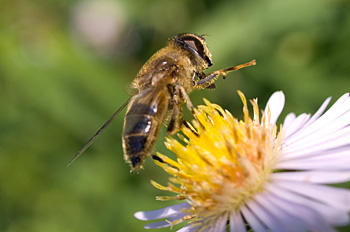Honey Health Benefits Touted as Bees Face Extinction
 Laura Krantz - GlobalPost Laura Krantz - GlobalPost
go to original
December 13, 2010


| | A bee perched on a daisy, rubbing legs together in the garden at La Quinetière, Buais, Normandy, France. (wwarby/Flickr) |  |
Laval, France — Sweet, healthy, vital for the planet, and perhaps even a good model for society. This is how beekeepers at a Honey Fair in Laval this fall described bees and the products made within their hives.

"Without the bee, the human race would die within five years," said Daniel Mareau, vice president of Abeilles Mayennaise, the beekeeping association of the Mayenne region of France.

This association, along with several artisan honey makers organized the small fair that took place in Laval's shady central plaza and attracted a trickle of passersby.

Abeilles Mayennaise displayed a dozen handmade beehives, as well as posters with information about bees.

That fuzzy striped creature with the dangerous backside pollinates between 70 and 80 percent of all plants, and thus is vital to the agricultural cycle, one placard at the fair stated.

The vendors sold honey as well as candy, cakes, honey wine and health products made with honey.

Dominique Girard, a third-generation French beekeeper, sells honey, pollen, royal jelly and propolis, a resin that bees use to seal the honeycomb.

And he swears by the health benefits of all four products.

Girard said propolis heals ulcers, inflammations and burns. Pollen, a spoonful of which can be sprinkled over your morning yogurt, contains amino acids, calcium, magnesium, manganese, phosphorus, potassium and over 14 vitamins, including B12, C, D, E and A, Girard said.

His leaflet also lists the human benefits of royal jelly, the special food for the queen bee and her babies. First on the list? Increased sexual ability.

It is also believed to be good for the immune system and boost self confidence.

Are the French cognizant of the benefits of bee-related products?

"The goal is to make them aware of the advantages," Girard said.

Equally important, fair participants said they want to publicize the dangers bees face.

In France, as well as in the United States, honeybees face the threat of imminent extinction.

In the U.S., commercial beekeepers who want to maximize honey production artificially increase the size of the honeycomb and inject chemicals into the hive. Bees also become sick from pollinating chemically treated crops.

In France, the abundance of beehives that existed in the past has all but disappeared, and bees also suffer from chemically treated crops in the countryside and city pollution in urban areas, Marceau said.

Abeilles Mayennaises is part of a recent movement in France to revive ancient and natural beekeeping techniques. The association, created only two and a half years old, already has 150 members.

"[The club's formation] is a response to people's interest to return to nature," said Mareau.

Mareau explained that nearly every home in this region used to have a beehive. The association is responding to the current lack by creating communities of beehives, including 17 in Laval, where members can come to tend the hives and collect honey.

Older, more experienced members teach younger ones the techniques of honey gathering, Mareau said.

Artisan honey is thick, grainy and scooped out of the pot with a spoon. The sweetness is less acute than the translucent, liquid honey found in grocery stores, but the flavor is more complex.

Like wine grapes, honey takes on the flavors of whatever grows around the hives, so beekeepers place the beehives in precise locations to achieve different flavors. Weather also influences the honey, so no two pots ever taste exactly the same.

Also among the booths at the Foire au Miel was Claude Lefèvre, 68, beekeeper for the past fifty-five years.

Lefèvre, who holds a university degree in beekeeping, began working with bees when he was 13 years old. He has traveled to Africa, South America, and the Middle East developing beekeeping methods.

Lefèvre worked in Guinea, where honey is used as currency, to develop bottling processes that facilitate honey trade.

In Columbia, he encountered African bees who migrated to South America but could not adapt to South American climate and vegetation.

Now Lefèvre lives in a small community north of Laval and has two apprentices. He said he loves beekeeping because it is a career of challenge, that is at once intellectual and practical.

"And nothing is more beautiful than arriving at a hive full of honey," he said. "It's fantastic."

Sophie de Rudder, 49, one of Lefèvre's two apprentices, was with him at the fair. Originally from Montpellier, a coastal town in southern France, de Rudder lost her job after an accident two years ago.

After having no success finding a new job, de Rudder turned to learning the trade of her dreams.

"They're not individualistic, they're collective," she said of bees. The idea of collectivity appeals to de Rudder, the mother of two, who said she spent many years struggling to keep a roof over their head.

"It's like a family, there is a spirit of cohesion," she said, describing the way bees venture out from the hive to find the best places for pollen in order to keep the entire hive alive.

"The group works for the wellbeing of the whole body."

Voila, a sentiment that will outlast your pot of honey. |



